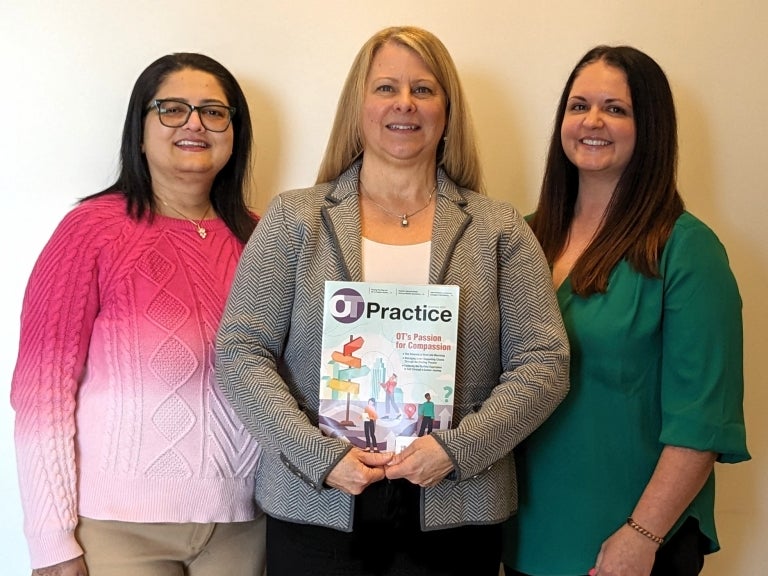
Occupational Therapy faculty Ketki Raina, Ann Marsico and Cara Lekovitch pose for a photo with the OT Practice Magazine.
University of Pittsburgh Department of Occupational Therapy faculty Ann Marsico, assistant professor and academic fieldwork coordinator, Cara Lekovitch, assistant professor, and Ketki Raina, associate professor and vice chair for Academic Affairs, have been making strides in refining the Doctor of Occupational Therapy (OTD) fieldwork program over the last year. Two new components – “Mission Possible” and “Stop, Talk, Roll” – have been added to the fieldwork program to promote students’ understanding of the clinical working environment and ability to navigate difficult situations in fieldwork.
Mission Possible
Teaching students to understand the potential challenging nature of the clinical working environment while in graduate school has increased in complexity. This is particularly true for helping students understand fieldwork experiences where interactions with clients are varied and frequent. This environment produces emerging and unfamiliar responsibilities. To address this need, Marsico and Lekovitch developed “Mission Possible,” a series of learning activities aimed at the development of critical interpersonal skills and work behaviors needed by OTD students during fieldwork.
“Mission Possible” learning activities are informal missions to teach these skills to students as they complete clinical and community-based in-person Level I fieldwork placements. These missions facilitate student engagement and participation in the experience to foster professional behaviors, communication skills and interpersonal skills. Topics for these missions have been identified by communities of interest: fieldwork educators, clinical coordinators, faculty and students. Missions are issued at the completion of in-class seminars and provide an action for the student to complete when engaging in the Level I fieldwork experience. Once completed, the student debriefs the experience through small group discussion in Level I fieldwork seminar.

Course Assistants Kara Travanti, Kyra Stolz and Valerie Jordan demonstrate a mission in Level I fieldwork.
Stop, Talk, Roll
Some students experience challenging situations during fieldwork, such as microaggressions, racist comments and hate speech in the clinical environment. These challenging situations are widely recognized to negatively impact students, increasing psychological stress, impeding engagement, and decreasing ability to cope with uncertainty. Challenging situations also negatively impact student learning during fieldwork.
To address this gap in fieldwork education, Marsico and Lekovitch adapted an existing evidence-based tool: Stop, Talk, Roll (Cheng, 2017) to provide OTD students with a framework for managing challenging situations in fieldwork. Students learn the skills to respond while minimizing psychological costs, growing stronger and becoming resilient in the workplace.
Stay tuned for future updates to the Pitt OTD fieldwork program!
